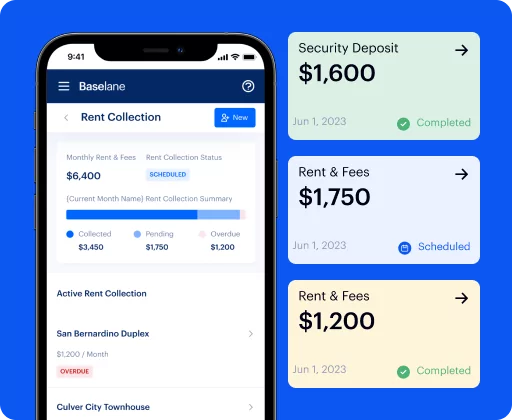Being an independent landlord involves more than just collecting rent. It’s about balancing tenant needs, property maintenance, and financial management.
In this blog, we will walk you through common challenges private landlords face and how property management software like Baselane can help. So, let’s start!
Key Takeaways
- Finding Good Tenants: Utilize online tools for thorough background and credit checks.
- Maintenance and Repairs: Implement proactive planning and digital communication channels for tenants.
- Managing Rent Increases: Retain tenants with strategic incentives and fair market rent prices.
- Timely Renovations: Base decisions on tenant feedback and market insights.
- Legal Compliance: Stay informed and adhere to laws on discrimination, leases, and evictions.
- Financial Management: Use Baselane for efficient rent collection and managing finances.
Pain Point No. 1: Finding a Good Tenant
As a private landlord, the challenge of finding good tenants is all too familiar. You have to fill units quickly while ensuring the tenants you’re leasing to will pay rent on time and keep the property in good condition.
The Impact of Vacancies
- Income and Mortgage Concerns: A vacant property means lost income, which can be particularly stressful for private landlords who own multiple rental homes. This situation could also affect your ability to make mortgage payments.
- Investment and Retirement Plans: Your rental portfolio isn’t just a source of income; it’s also part of your retirement plan. Any gaps between tenants for repairs and cleaning can disrupt these plans, especially if you have to pay for any property damages.
Finding New Tenants
- Tenant Search: There are many online resources to help private landlords find tenants. These include websites and tools for advertising rentals, connecting with prospective tenants, and conducting essential background and credit checks.
- Automating the Process: These platforms automate tasks typically handled by property management companies, such as rental listings, applications, tenant screening, and more. This helps private landlords streamline the process of finding reliable tenants to maintain consistent occupancy and income.
Pain Point No. 2: Performing Maintenance and Repairs
You are responsible for the ongoing maintenance and repairs of your rental property. This includes general upkeep tasks like mowing lawns and fixing leaks in pipes and fixtures. While maintenance companies can handle these tasks, many private owners manage any repairs and maintenance to reduce costs.
Proactive Maintenance Planning
- Anticipating Issues: As a private landlord, planning for property maintenance is crucial. Minor issues, if not addressed promptly, can escalate into major, costly repairs.
- Regular Inspections: Conduct regular inspections of your properties. Not only does this help identify potential problems quickly, but it also keeps your properties in top condition to stay competitive in today’s rental market.
Effective Tenant Communication
- Open Communication: Tenants should feel comfortable reporting maintenance issues without fear of being ignored. For instance, provide your tenants with an email or phone number to contact if they have questions.
- Online Requests: With online forms, tenants can report issues that you can easily track and address. For example, you could create a form where tenants can enter a description of the issue, attach photos, and select a date and time for the repair.
Comparing Costs and Quality
- Cost-Effective Solutions: For private landlords renting out properties, finding cost-effective solutions for maintenance and repairs is important. This might involve learning some DIY skills or finding reliable, affordable service providers.
- Maintaining Property Value: Regular maintenance keeps tenants happy and helps preserve the value of your property, which is essential for private homeowners holding rental properties as long-term investments.
Pain Point No. 3: Losing a Tenant Due to Rent Increase
Rent increases are a challenge for private landlords. Your rent prices need to align with the housing market while maintaining profitability, but quality tenants could still leave for more affordable options.
Balancing Market Trends and Tenant Retention
- Market Analysis: Landlords, especially those in apartment complexes or private owners renting properties, must carefully analyze market trends before deciding on rent increases.
- Tenant Communication: Promptly notify tenants about rent hikes and maintain open communication. This transparency helps manage tenant expectations and comply with local landlord-tenant laws to avoid legal issues.
Incentives for Tenant Loyalty
- Value-Added Offers: To balance rent increases, consider incentives. For example, upgrading an appliance can significantly boost tenant satisfaction. This strategy is particularly effective for private homeowners focused on sustaining long-term tenant relationships.
Pain Point No. 4: When is a Good Time for Renovation
Maintaining and enhancing your rental property’s value requires knowing when to renovate. Renovations can raise rents, but they require strategic planning and understanding current and potential tenant preferences.
Feedback and Market Insights
- Gather Tenant Feedback: Survey your tenants or research upgrades in similar properties. This approach helps identify the most impactful renovations, whether in private homes or apartment complexes.
- Analyze Trends: Stay informed about local housing market trends. For instance, if the local market favors homes that are more modern and energy-efficient, making these types of renovations can help your property stand out.
Efficient Renovation Planning
- Budget Wisely: Carefully plan for all renovation expenses. This might include offering reduced rents or arranging temporary relocations for tenants during major upgrades.
- Focus on High-Impact Areas: Prioritize renovations that significantly enhance the tenant experience and property value, like modernizing kitchens or bathrooms.
Pain Point No. 5: Avoiding Legal Trouble
Before renting your property, it’s important to know all the federal and state laws. The good news is that some of the most important laws are the same throughout the country, such as:
Laws on Discrimination
- Fair Treatment: It’s imperative to avoid discrimination based on sex, disability, legal status, race, religion, or national origin. This applies to all property owners, whether renting a single-family home or managing multiple units in apartment complexes.
Laws on Lease Documents
- Lease Clarity: Ensure your lease agreements are legally compliant and straightforward. You should detail the lease length, rental rate, and tenant names. Include clauses like the recommendation for renters insurance and any minimum credit score requirements for new tenants.
Laws on Required Disclosures
- Informing Tenants: You must provide tenants with information about state and local laws, as well as specific landlord policies. Disclosures might include potential health hazards like lead-based paint or mold.
Laws on Repairs
- Maintenance Responsibilities: Respond promptly to maintenance requests. Both landlords and tenants share the responsibility for maintaining the property. Tenants can withhold rent if essential health and safety repairs are not made.
Laws on Deposits
- Deposit Handling: Security deposits are common but must be managed correctly. They can cover damages or unpaid monthly rent, but misuse can lead to legal issues.
Laws on Non-Ineterference With Use
- Respecting Privacy: Give tenants at least 24-48 hours’ notice before entering a rental unit. This respects their right to privacy and ensures you don’t interfere with their quiet enjoyment of the property.
Laws on Evictions
- Eviction Process: Follow state laws meticulously during evictions. Grounds for eviction include non-payment of rent, neglecting repair duties, or causing property damage beyond normal wear and tear. Always provide proper notice and follow legal procedures.
Although a landlord owns a rental property, tenants have special rights against discrimination, harassment, arbitrary rent increases, and wrongful eviction.
Pain Point No. 6: Rent Collection and Managing Finances
For private landlords, rental income is often the primary source of income, so timely and full payments are essential. Regardless of how many units or properties are being managed, many landlords find rent collection and financial management overwhelming.
The Challenge of Rent Collection
- Consistent Cash Flow: Private landlords need a steady rental income flow. Late or missed payments can significantly impact financial stability.
- Dealing with Late Payments: Addressing late payments and setting up efficient rent collection systems can be a daunting task for many property owners.
- Tracking Expenses: Keeping track of every expense, saving receipts for tax purposes, and managing paperwork require a lot of time private landlords don’t have.
Baselane: A Comprehensive Solution
Thankfully, there is a solution. With Baselane landlord banking, private landlords can simplify rent collection, expense tracking, accounting, and more.
- Online Rent Collection: Baselane offers online rental collection via ACH transfer, debit card, and credit card. This system has automatic late fees, rent reminders, and auto-pay options.
- Automated Bookkeeping: With Baselane, landlords can digitize transactions and maintain a consolidated view of finances, eliminating manual bookkeeping.
- Digital Banking for Landlords: Baselane lets landlords connect bank accounts, track transactions, and manage finances online. This includes creating sub-accounts for different properties or purposes, such as savings for renovations or separate security deposits.
Advantages of Baselane Landlord Banking
- High-Yield Checking: Earn up to 4.19% APY interest, significantly higher than the national average, even on security deposits.
- Cash Back Rewards: Unlimited 1% cash back on all purchases, with 5% back on home improvement spending.
- Multiple Accounts: Create multiple accounts per property, with no account fees or minimum balances.
- Custom Spend Controls: Physical and virtual debit cards with custom spend controls and automated transaction tagging.
- Seamless Integration: Integrated with Baselane’s bookkeeping, reporting, analytics, and rent collection tools.
- Security and Privacy: End-to-end encryption and FDIC insurance up to $2,500,000.
- Convenient Banking: Make and accept payments quickly from any device, with free cash withdrawals and deposits at over 55,000 locations across the US.
- No Hidden Fees: Baselane banking is free for landlords, with no service fees, overdraft fees, or ACH transfer fees.
Final Thoughts
Property management is tricky but manageable, even for novice landlords. Challenges like finding tenants, repairs, and finance management can tempt you to outsource, but these costs can add up quickly.
Baselane provides a simple, cost-effective way to handle these tasks for free. It streamlines rent collection, bookkeeping, and banking, making property management easier and more affordable.
Sign up for FREE and simplify your property management today!
FAQs
There are several things a landlord can do such as purchasing good insurance, making sure they are buying the right property, and streamlining their rent collection and other processes.
In every business, there’s always going to be a risk. The reason for bankruptcy sometimes is taking too many of these risks. For example, taking on too many down payment deals or buying too many rentals too quickly can create less equity and more debt. All in all, making the right choices and taking the right deals can de-risk real estate investing and make your rental investments profitable.
Baselane is a free platform for landlords and renters. Despite their constant efforts in improving their services, Baselane is completely free with no hidden charges.







